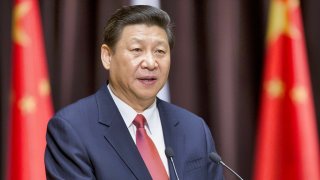The FTC and DOJ are Aiding China’s Tech Dominance Ambitions
The Biden administration seems determined to target an industry that is both extraordinarily innovative and key to competition with Beijing.
The United States and China are locked in an accelerating race for dominance over the technologies of the future, from autonomous vehicles to artificial intelligence to hypersonic missiles. While Beijing is marshaling every tool in the Communist Party’s totalitarian kit to dominate the industries of the future, too many in Washington seem content to let ideology and dogma trump American economic and national security. Nowhere is that more evident than in the Biden administration’s misguided approach to antitrust policy.
China’s dedication to dominating future technologies isn’t a state secret. It is enshrined in the “Made in China 2025” initiative and numerous public statements from the Chinese leadership. Whether it is in telecommunications capabilities like 5G, cloud computing, AI, autonomy, electric vehicles, shipbuilding, and more, Beijing has openly pledged to invest extraordinary amounts of state-directed capital, both financial and human, into attaining global preeminence. Such investments will free China from potential foreign dependence in these areas and allow Beijing geopolitical leverage over countries that fail to lead in these emerging sectors.
Yet despite the very real danger of China assuming the lead in sectors key to the twenty-first century’s economic future, the Biden administration’s antitrust crusaders are launching full-steam ahead on a strategy guaranteed to strengthen Beijing’s technology pursuit at the expense of American companies, workers, and national security.
Take, for instance, the recent actions by Federal Trade Commission (FTC) Chairwoman Lina Khan. Ms. Khan’s tenure at the FTC has been marked by both zealous enforcement of outdated interpretations of antitrust law and almost unanimous judicial rejection of her highest-profile cases. While 2023 has seen rapid increases in AI investment by America’s largest tech companies, demonstrating a thriving competitive market, Ms. Khan has publicly put AI in the FTC’s crosshairs, presaging an attempt to throttle such innovation and stifle the U.S. competitive advantage in a technology of unique economic and strategic importance.
Earlier this year, at Ms. Khan’s direction, the FTC sent agency officials to Europe to help enforce the European Union’s Digital Markets Act, specifically designed to harm American tech companies to benefit their EU counterparts. To be clear, a U.S. regulatory agency took U.S. taxpayer dollars to assist foreign competitors in reducing the advantages held by American companies, employing American workers, in a global race for tech leadership.
Ms. Khan is also taking aim at American tech here at home. The FTC is finalizing its latest antitrust lawsuit to break up one of the leading digital commerce platforms, in this case, Amazon. This lawsuit and others like it are unlikely to change antitrust enforcement. Instead, they risk undermining American innovators and damaging the millions of small businesses that depend on Amazon’s tools to help find and service customers. This new attack comes fresh off the heels of Khan’s failed attempt to block Microsoft’s purchase of Activision. The pattern is obsessive and blatantly ideological.
Similarly, Jonathan Kanter, Assistant Attorney General for Antitrust at the Department of Justice (DOJ), has sought to use his broad authority to pursue an aggressive agenda that would stifle U.S. tech innovation in the name of “competition.” The DOJ recently revealed its proposal for new merger guidelines drafted specifically to reduce corporate acquisitions.
Yet, the vast majority of case law cited in the draft guidelines was decided before the mid-1970s. How can modern businesses operate in a regulatory environment constructed long before the digital economy existed? Kanter defended the new yet antiquated guidelines as “valid law.” In reality, it’s a thinly veiled attempt to change the law through the administrative state. Unsurprisingly, Ms. Khan took part in drafting the guidelines as well. Earlier this year, Kanter announced plans to hire more data experts to scrutinize digital data methods for further antitrust enforcement. This seems an awful lot like looking for problems where none exist. American taxpayers should not foot the bill for Kanter’s wild goose chase.
Open competition in the marketplace is critical to a free economy, but the Biden administration seems determined to target an industry that is both extraordinarily innovative and highly competitive. All the while, numerous Chinese firms, like TikTok, operate on American soil unimpeded, with potentially serious national security consequences. The misguided antitrust craze of Ms. Khan and Mr. Kanter runs the serious risk of hobbling American firms long enough to permit Chinese competitors an advantage and squander our hard-won technology gains. Allowing a global tech leadership shift to China would not benefit the American consumer and would devastate U.S. national security in the decades ahead.
About the Author
Alexander B. Gray is Managing Partner at American Global Strategies LLC, a consultancy. He served as Chief of Staff of the White House National Security Council, 2019-21.
Image: Shutterstock.com

